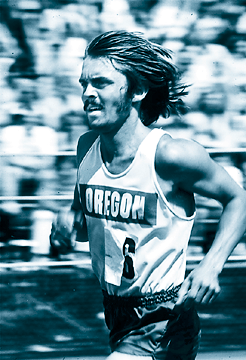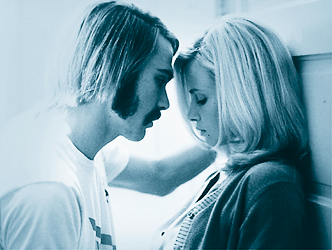


Video captures runner’s
By Pat Bigold
limitless courage
Star-BulletinHe said he could endure more pain than anybody he ever met, and that if a race came down to sheer guts, he was the only one who could win it.
That's what Lanikai resident Kenny Moore remembers about Steve Prefontaine. And he knew that the cockiness of the man was not always easy to take.
But Moore, Prefontaine's teammate at the 1972 Olympics in Munich, saw a compelling story in both the character and the brief career of the cult hero athlete dubbed the "James Dean of running."
When Prefontaine's MG convertible overturned in the hills of East Eugene, Ore., May 30, 1975, he held every American record from 2,000 meters to 10,000 meters. He was 24.
Moore collaborated with Robert Towne ("Chinatown") in writing the script for the 1998 feature film "Without Limits," which was released by Warner Brothers last week on video.
"It's a shame that it didn't play in Hawaii where there's a such a running community," said Moore, also an executive producer on the project. He conceived the film while he was working on a book about Prefontaine's University of Oregon track coach, Bill Bowerman, in the late 1980s.
The movie played in selected cities last fall but played only once here at an invitation-only sneak in December 1997 during Honolulu Marathon weekend.

In the audience at the sneak were 1972 American Olympic marathon gold medalist Frank Shorter, the last man to speak to Prefontaine the night he died; local resident Gerry Lindgren, international distance star of the 1960s; and another local resident, former NFL star Russ Francis, an Oregon track teammate of Prefontaine. They are all portrayed in the film.Two acquaintances of Prefontaine who were in town but didn't attend that night were American female distance racing legend Mary Decker Slaney, who said she would've become too emotional watching her old friend come back to life, and local chiropractor Verna Victoria.
Victoria said Prefontaine, true to the brash portrayal by Billy Crudup in the movie, walked up to her his first year on the Oregon campus, introduced himself and proceeded to regale her about himself. They dated a month.
"He was a very sweet, old-fashioned type of guy who would bring me flowers," she said. "He was a storybook romantic. But he enjoyed talking about himself and it was obvious his life revolved around running."
She said she knew that a lot of the men on campus did not like him because he wore his self-confidence on his sleeve.
They met before Prefontaine began his featured romance with Mary Marckx (Monica Potter) in the movie. Victoria recalled that, just as he did for Marckx in the story, Prefontaine offered her running shoes. She declined.
Lindgren said he was glad to find some of the running philosophy he'd discussed with Prefontaine in the film. Particularly, it was the idea that the degree of effort was more important than the victory. Prefontaine argued with Bowerman that the strategy of laying back and surging late to win was cowardly.
But Lindgren criticized Prefontaine's portrayal in the movie as a likeable person.
"I couldn't find too many people around who had any love for Pre," said Lindgren who defeated him in an exhibition race at Punahou in the early 1970s.
"His head was so big and he was so much into himself that he was very, very hard to deal with. He said a lot of things that made people very angry. The movie really missed the mark in terms of his personality, but I guess it had to in order to create the hero type of thing."
"Without Limits" contains some of the most heart-pounding running segments on film. Among the most dramatic is Prefontaine's bloodied victory in the 1970 NCAA 5,000 meters. He continued despite breaking open a 12-stitch wound in one foot.
Another is his fabled knock-down-drag-out battle with Finnish running legend Lasse Viren in the 1972 Olympics. Prefontaine had predicted that if it came down to a "guts race," he would win. But he burned every ounce of fuel pursuing Viren and wound up out of the medals.
The movie was made on a $25 million budget with Tom Cruise and Paula Wagner ("Mission Impossible") as producers. Cruise was a driving force to keep the film alive even after another producer, Jon Lutz, secured rights to the story from Prefontaine's family in 1994.
Lutz's film, "Prefontaine," was released in January 1997.
Prefontaine was born and raised in Coos Bay, Ore., a tough coastal town. His dynamism was in his willingness to back up his boasting with explosive, compulsive, sometimes almost irrational efforts on the track. He had the in-your-face brashness of Dennis Rodman, John McEnroe and Randy Moss, and turned distance races into a form of combat.
Therein was his appeal. He became a rare cult hero in a sport that today struggles to make itself exciting again.
"How he won mattered to him more," eulogized Prefontaine's University of Oregon coach, Bill Bowerman (played by Donald Sutherland). "He thought the real purpose of running is not to win a race but to test the limits of the human heart."
Click for online
calendars and events.